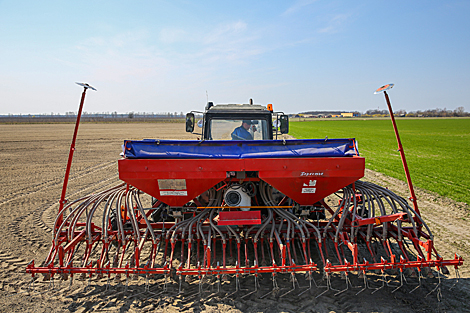Events
Lukashenko informed about efforts to reduce heat stress in crops, livestock

Extremely hot weather came to Belarus in June. Last week air temperatures exceeded the climatic norm by 5-8°C. This week peak temperatures exceeded the norm by 8-10°C in some places. The situation is aggravated by the lack of rain. According to weather forecasts, hot weather will stay, with light rains only in certain regions. Extreme heat and drought have a negative impact on agriculture. On 12 June, Belarus President Aleksandr Lukashenko listened to the reports of Agriculture and Food Minister Anatoly Khotko and Deputy Prime Minister Vladimir Dvornik who is also in charge of the agricultural industry. They informed the head of state about the state of affairs in the agricultural industry and the additional measures that were taken to protect the harvest.
The president has already spoken about the need to take additional measures in these hot weather conditions. “We will have problems in the eastern, western and central parts of the country depending on the soil. On light soils crops have started going yellow. So we should harvest them in time. Now hay harvesting is in progress,” Aleksandr Lukashenko said. “We need to think things through in plant growing given the weather. We should not let a single crop go wasted,” he added.
“If we have to use grain crops as forage, we will need to make up for grain. I have great hopes on corn. It is growing well in all parts of the country (I am monitoring this), even on sandy soils. I suggest we make an emphasis on corn,” the head of state noted. The president emphasized the importance of using the proven corn conservation technology. “Livestock likes this fodder. Conservation will be cheaper than drying by some 25-30%. In fact, corn is similar to other grain crops in efficiency and production costs. We need to pay close attention to corn. All the other unused lands should be planted with annual and other crops,” the president said.
According to Anatoly Khotko, this year areas under corn grew by 110,000 hectares over the planned size. “We expect to harvest an additional 1 million tonnes of grain for animal husbandry. Proven conservation technologies will help reduce the cost of fodder, facilitate technological processes and increase animal husbandry production,” he is convinced.
The minister describes the situation in agriculture as complex. The expectations to get a good harvest are very high, but hot weather and irregular rains make it more difficult. “We are doing our best to care for livestock and ensure food security in the country. We inspect grain crops in every oblast, every region. And if we see them drying, we harvest them as green fodder and plant intermediate crops. We have already replaced winter crops which were in a bad or unsatisfactory condition. Prompt measures help us produce additional fodder,” he said.
On the whole, this year’s grain harvest is expected to exceed the amount of the previous year. There will be enough grain for food production in Belarus, Anatoly Khotko said. “Besides, we have reserves of flour and cereals from last year,” he added. However, the minister emphasized that the main objective is to get a maximum harvest this year.
The first cutting of grass hay is coming to an end. Vitebsk Oblast is still lagging behind and needs to step up. “Working groups from the ministry come to regions to provide methodological and practical assistance, monitor progress in fodder harvesting. It should be done efficiency and on time. All these issues are manageable, and we are using resources and manpower for it,” the minister assured. First-cut grass hay is even better this year. “We started to harvest fodder a bit later this year, but the cutting period was reduced by 8-9 days. Of course, the quality of fodder will be better as a result. And we believe that we will procure even more grass hay than we did last year,” Anatoly Khotko said.
However, weather conditions will become even more complicated for agriculture, as forecasts say. “Due the lack of rain in the first ten days of June, soils became dryer all over Belarus. Dry soils are widespread in southeastern, eastern and western regions. Grain crops suffering from dry soil started to droop and become yellow. Soil drying will continue in the near future because of the heat and the lack of rain,” Belhydromet, the national center for hydrometeorology, informs. Complicated weather conditions persist in certain regions of Gomel Oblast and Minsk Oblast. In these conditions, it is especially important to take prompt measure to protect the harvest. The Agriculture and Food Ministry assured that the situation is under control.
Responsible executives will report to the president on the state of affairs in crop farming next week.
Valeriya GAVRILOVA,
BelTA







 print version
print version make home page
make home page add to bookmarks
add to bookmarks

